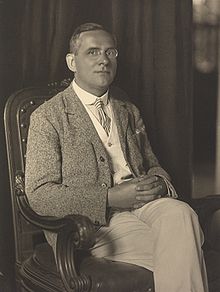
Back موريتز شليك Arabic موريتز شليك ARZ موریتس شلیک AZB Мориц Шлик Bulgarian মরিস শ্লিক Bengali/Bangla Moritz Schlick Catalan مۆرتیس شلیک CKB Moritz Schlick Czech Moritz Schlick Danish Moritz Schlick German
Moritz Schlick | |
|---|---|
 Moritz Schlick around 1930 | |
| Born | Friedrich Albert Moritz Schlick 14 April 1882 |
| Died | 22 June 1936 (aged 54) |
| Education | University of Heidelberg University of Lausanne University of Berlin (PhD, 1904) University of Rostock (Dr. phil. hab., 1910) |
| Era | 20th-century philosophy |
| Region | Western philosophy |
| School | Analytic philosophy Vienna Circle Logical positivism Foundationalism[1] |
| Theses | |
| Doctoral advisor | Max Planck |
| Doctoral students | Rudolf Carnap Karl Popper |
Main interests | Logic, philosophy of science, philosophy of mathematics, ethics |
Notable ideas | General theory of knowledge Beobachtungssatz (observational statement)[2] Internal and application rules of grammar[3] |
Preview warning: Page using Template:Infobox philosopher with unknown parameter "influences"
Preview warning: Page using Template:Infobox philosopher with unknown parameter "influenced"
Friedrich Albert Moritz Schlick (/ʃlɪk/; German: [ʃlɪk] ; 14 April 1882 – 22 June 1936) was a German philosopher, physicist, and the founding father of logical positivism and the Vienna Circle.
- ^ Ted Poston, "Foundationalism" (Internet Encyclopedia of Philosophy)
- ^ Hans Günther Ruß, Wissenschaftstheorie, Erkenntnistheorie und die Suche nach Wahrheit. Stuttgart, Kohlhammer Verlag 2004, p. 71.
- ^ Thomas Oberdan, Protocols, Truth and Convention, Rodopi, 1993, p. 110.
- ^ B. F. McGuinness (2013). Moritz Schlick. pp. 336–7.
Once again, one has to understand Schlick's world conception, which he took over from Schopenhauer's world as representation and as will. ... 'To will something' – and here Schlick is heavily influenced by Schopenhauer – .